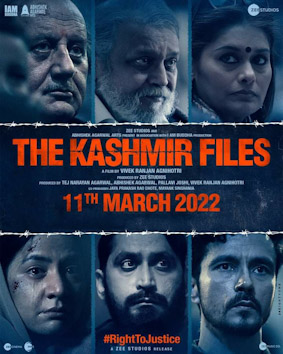It is not easy to write about movies or books which bare one’s bottled-up horrors and agony. But then, that is the strength of Vivek Ranjan Agnihotri’s ‘The Kashmir Files’. It has made me, a displaced Kashmiri Pandit (Hindu), to own it, to call it my story. And that is no small feat.
For the last 32 years, I have been waiting for someone in the mainstream, someone other than a Kashmiri Pandit, to tell my story as it is. Agnihotri has delivered it, with finesse and sagacity. He and the team ‘The Kashmir Files’, have done what nobody else in the Indian cinema could accomplish.
Since 1992, many directors have made movies about Kashmir starting from ‘Roja’. In most of these movies, Kashmiri Hindus did not figure anywhere as if they were never there in Kashmir to begin with. Some directors who claimed to have made a movie in our name, ended up only making a caricature of ‘the untold story of Kashmiri Pandits’.
Therefore, I was extremely skeptical this time. I was not even sure if I should go and watch the special screening of ‘The Kashmir Files’ in New Delhi, here last night.
I went with a resolve that I will watch it dispassionately as a reviewer and not as a displaced Kashmiri Hindu. In fact, I told myself to hold back because generally, most of us tend to choke at the mere narration of our exodus and exile. So I watched each and every scene, carefully as a critic to pick holes in the movie. I came out assuaged.
The Kashmir Files has peeled the complex layers of the final chapter of the systematic genocide of Kashmiri Hindus since the 14th century in Kashmir, beautifully and intelligently. It has avoided both Bollywood melodrama and also the cheap imitation of the Tarantino mania afflicting some of our directors, of late.
Instead, The Kashmir Files is a powerful contestation of emotions and intellect, of truth and untruth, of history and propaganda, in the context of the ethnic cleansing of Kashmiri Hindus. It brings out, in multiple shades, the denial of our story by the Indian bureaucracy, media, academia and intelligentsia. At the same time, the movie also very subtly, exposes the face behind the mask, responsible for the genocide. Agnihotri has done this with enormous craft.
He has weaved the plot of the movie with a lot of creativity and loaded each character with history of several players of the Kashmir conflict and executed it coherently back and forth through the last three decades. The most gruesome acts of terror unleashed on Hindus in Kashmir and later their life in displacement and destitution in refugee camps in Jammu, have been shown with remarkable intensity, and yet poignantly. All of this would not be possible without Agnihotri’s cast and his team.
In The Kashmir Files, you will see, an extraordinary Anupam Kher performing as if it were his grand finale as an actor. Throughout his career, and even in real life, Kher never comes across as a Kashmiri Pandit in his accent or mannerism. But in the movie, he transforms himself completely into a typical Pandit of my grandfather’s generation, effortlessly. If there is another ‘Saransh’ moment in Kher’s career, it is his mastery over the soul and consciousness of his character in The Kashmir Files.
Bhasha Sumbli, a displaced Kashmiri Pandit and a National School Drama (NSD) product, has played her character so well that you will not leave the theatre without a tug at your heartstrings. Some of the most goosebump moments in the movie are hers. A debutant in cinema, Bhasha will go far in her acting career, given her ability to reveal multitude of emotions on her face without saying much. She has done proud to her community as well as the film fraternity.
The widely acclaimed actor Pallavi Joshi’s performance in the movie, has been brilliant as usual. She is so convincing in her role that even the people she represents in the movie will find her holding a mirror to them. The most dynamic and transformational character in The Kashmir Files has been played by actor Darshan Kumar of the Family Man fame. He displays his depth and range as an actor through his monologue in the Kashmir Files. He knows exactly where to pause, how to breathe and when to scream, while keeping his audience hooked to his intense face.
Mithun Chakraborty, Mrinal Kulkarni, Puneet Issar, Prakash Belawadi, Chinmay Mandlekar and others have portrayed real life characters of the Kashmir story, superbly. The depiction of Kashmiri Hindu culture, habits, accent and music, is authentic and in many ways, refreshing. The music is hauntingly melodious and evokes a heartache. The cinematography in Kashmir as well as Himachal, where most of the movie was shot, is stunningly breathtaking.
The movie which is releasing on March 11, could have been shorter and edited more tightly. Some of the scenes are a bit too long and some of the unnecessary scenes have added to the length of the movie. But one can sit through the long movie because the positives of the movie outweigh its shortcomings. Not only has Agnihotri told the truth about the Kashmiri Pandit genocide boldly but he has also raised the bar for Indian cinema to present India’s own battles before the world, honestly and ingeniously.

